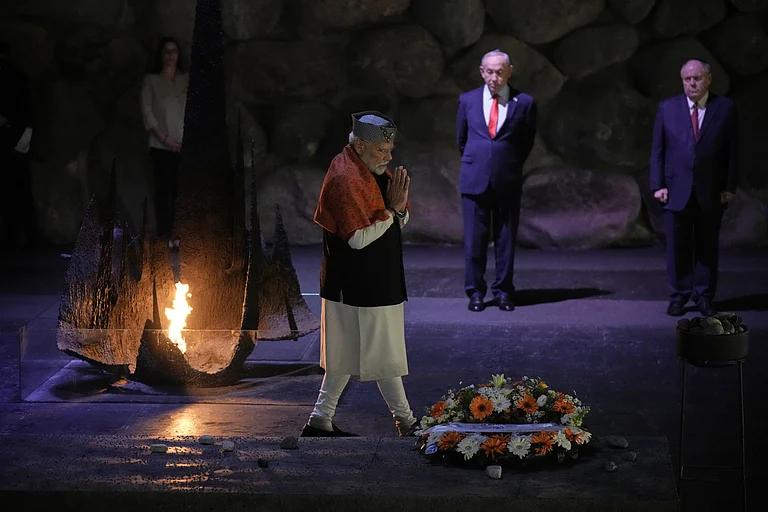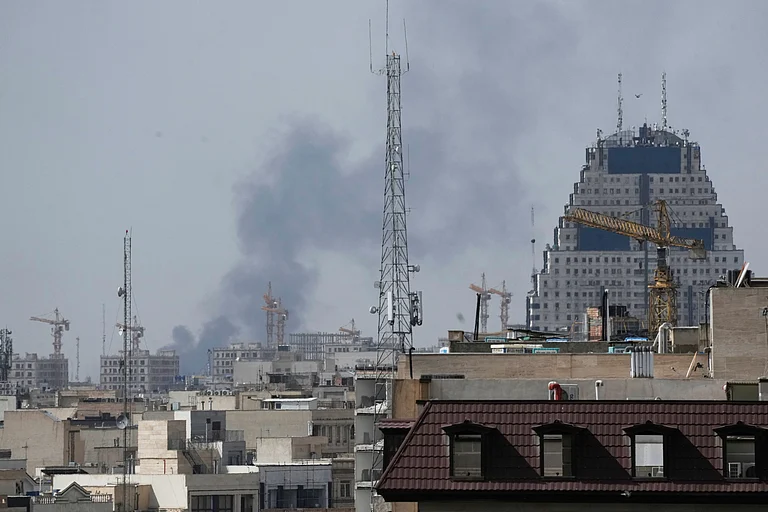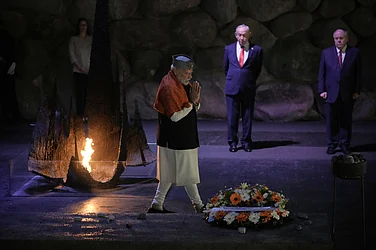On March 24, Prime Minister Narendra Modi announced a 21-day nationwide lockdown, which would be extended thrice concluding on May 31, 2020. This brought the invisible migrant workers in Indian cities out of their slums and shanties, and under media glare. Around 12 crore of India’s estimated 46.5 crore workforce are migrant workers. Faced with starvation, they had chosen to walk home. Thousands of them died. Many of them on the train tracks. It was apathy and abandonment. We had let them down as a nation and as a people.
Archival memory of apathy, abandonment and exodus. A reporter’s notebook as an architectonic resistance to all falsehoods, an archive for the future. I was on the ground like many other reporters. These are some of my diary entries from the lockdown in 2020.
May 7, 2020
A crane, many skyscrapers and an evening sun reflected on the windows of the buses that carried migrant workers from shelter homes to the New Delhi Railway Station to board the first Shramik Special train to Madhya Pradesh. I think I saw tears in a pair of eyes. The buses moved slowly. There would be no interviews.
Today evening, about 1,100 migrant workers left for their villages in MP in the train. Around 75 buses brought them to the station after they had been screened at the shelter homes. More quarantine awaits them when they arrive in their state.
The train left at 8 pm. Many are still waiting for their states to open up and issue a directive to the Centre so trains can ferry them back to Uttar Pradesh and Bihar.
***
The couple walked for a few hours to reach the station today evening. The wife is seven months pregnant and both of them lost their jobs as daily wage worker and as domestic help in Todapur in Delhi when the lockdown commenced. They paid Rs 3,200 as rent but ran out of money. They waited in line to get food, and everyday, he checked if there was a way to go home somehow. Today morning, he heard there was a train going to Madhya Pradesh.
They weren’t allowed to board the train because they weren’t in the shelter homes and for now, only those who are living there are being allowed to board.

Vimla was standing in a corner in the dark holding a few packets someone had handed to her that evening when she had come to the station to take the train back home. She carried a small bag that her husband, Puran Lal, kept on the pavement while they begged the police officers to let them board. In the bag, she said she had put a saari that was gifted by Puran Lal for Karwachauth. She had kept Parle G biscuits to distribute to the children in the family. She had also packed the idols of gods. “Why leave gods behind?”
May 8, 2020
Some chits of paper have only your phone number. You keep throwing them in the windows of the buses that are taking migrants to the station hoping someone will call. After throwing maybe 30 such notes since last evening, they started calling me today from the train saying they were happy to go home finally. The station is sealed and no reporters or photographers can get inside.
Last night, nobody called. But today, a few did.
(On May 7, 2020, when a Shramik Special train was to leave the New Delhi Railway station, a bus full of migrant workers stopped for a brief while before it entered the cordoned-off lane that led to the station. A few of them looked out at the reporters and photographers who had been waiting at the spot. The bus moved slowly and there wasn’t any way to get an interview. The television people had started their ‘lives’ with images of buses with migrant labourers sitting inside in the background. For us, the story meant more. I returned the next day and threw those notes inside the bus again.)
***
A 16-year-old boy on the Shramik Special train that left on May 8 from New Delhi Railway station to Muzaffarpur in Bihar decided to call me. He told me he used to work in an electrical shop and had come to Delhi a few months ago. He is from Mansurpur and he has his parents, a brother and three sisters at home. He had tried to go home walking but they had been caught by the police and sent to the quarantine centre and then were told there would be a train to take them home.

He said they would get dinner in Lucknow.
May 9, 2020
At 11:30 am on May 9, 2020, a bunch of migrant workers were standing in a queue in Muzaffarpur in Bihar in the sun after having been stamped. The young boy called again and said they hadn’t been given any food since they got off the Shramik Special train from Delhi. They had been stamped. He sent a photo of his stamped wrist. It said “21 days”.
Last night on the train, they were told they’d get dinner. They were handed Kurkure and two packets of biscuits. The boy had been grateful for that.
May 20, 2020
In the yellow light, his eyes looked at you with great emptiness in them. He kicked the wheel of the cycle. It started rotating. He watched it for a while. There was a little backpack he was carrying, with a few clothes. The food they had brought with them from Najafgarh had gone bad. His cousin, Shyam, was quiet. In his little bag, he was carrying two things—a pair of tongs and a piston. For his wife. He had bought them before the pandemic rendered them so poor they couldn’t even afford food. Shyam used to drive an e-rickshaw in Najafgarh. And Balram, who came to Delhi seven years ago as a 15-year-old, used to work in a chai stall and then took a loan of Rs 30,000 to buy an e-rickshaw. He used to rent out a little room in Noida. He got the e-rickshaw two days before the lockdown was announced and when his money got over, Shyam asked him to come to his house. Both decided to leave for home after it seemed to them that lockdowns would become an endless cycle. They decided to cycle their way to their village in Samastipur in Bihar. They bought an old rusted bicycle for Rs 500. It looked like it could break down any moment but they put their trust in it. They had Rs 1,000 with them. They gathered their meagre belongings in two little bags and left Najafgarh in the morning to reach the Delhi-Noida border so they could cross into Uttar Pradesh. But they were stopped by the UP police.
The police beat up one of the labourers when he tried to ask which bus would take them home. Buses and small trucks were being turned away at the border. It was after 7 pm. A few policemen said there were labourers hiding inside the small carrier trucks desperate to go home. After so many labourers died on their way home, the UP government said they wouldn’t allow anyone on foot or on bicycle in their state. They said they would make arrangements for the workers to go home. But Balram and Shyam kept repeating that they knew they would be asked to pay Rs 5,000 for a seat in a truck. They didn’t have that kind of money.
May 21, 2020
Balram called to say there might be a bus for them. We went to see them again at 3 am. Balram had changed his shirt. The black shirt had pink roses printed on it. “I like this shirt,” he said. They said they would leave the cycle to anyone who might need it. We set out to find the bus. We couldn’t.
He later called to say they managed to find a bus to Bihar. They paid Rs 1,000 each for a ticket on the private bus.
Among the things they carried, they also carried the still skies of the city, the humidity, the hunger, the bites of mosquitoes, the stench of sweat, the fear, the betrayal, the abandonment, and the loss of dignity.
And for many hours, I sat and thought of the tongs and the piston among the things they carried back with them.
March 30, 2023
I am re-reading the entries from the lockdown. We had gone back to meet Vimla in her one-room tenement in Delhi. When her child was born, she called to ask if we could suggest a name for her.
There are hundreds of entries from the lockdown. To witness and to record is a form of resistance. To remember is an act of honoring those who told us their stories. This issue is dedicated to all the migrant workers who we let down as a nation and as a people.
(This appeared in the print edition as "Lest We Forget")


























